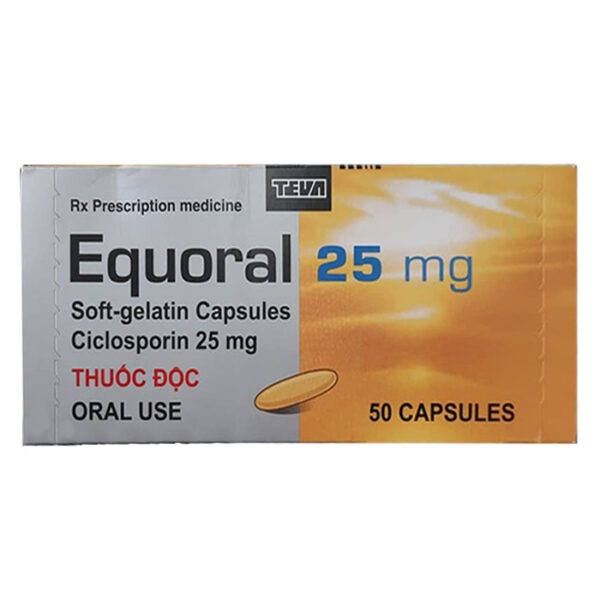
How to use Equoral
Patient Information Leaflet: Equoral 100 mg/ml oral solution
Equoral, 100 mg/ml, oral solution
Cyclosporin
Read all of this leaflet carefully before taking this medicine.
- Keep this leaflet. You may need to read it again.
- If you have any further questions, ask your doctor, pharmacist, or nurse.
- This medicine has been prescribed for you. Do not pass it on to others. It may harm them, even if their symptoms are the same as yours.
- If you get any side effects, talk to your doctor, pharmacist, or nurse. This includes any possible side effects not listed in this leaflet. See section 4.
Contents of the pack and other information
- 1. What Equoral is and what it is used for
- 2. Important information before taking Equoral
- 3. How to take Equoral
- 4. Possible side effects
- 5. How to store Equoral
- 6. Contents of the pack and other information
1. What Equoral is and what it is used for
What Equoral is
This medicine is called Equoral. It contains the active substance cyclosporin. This medicine belongs to a group of medicines called immunosuppressants. These medicines are used to reduce the immune response.
What Equoral is used for and how it works
- In patients who have received an organ, bone marrow, or stem cell transplant, Equoral works by controlling the immune system. Equoral prevents the rejection of the transplanted organ by blocking the development of certain cells that would normally attack the transplanted tissue.
- In patients with autoimmune diseases, where the immune system attacks the body's own cells, Equoral stops this immune response. These diseases include eye diseases that can cause blindness (endogenous uveitis, including Behçet's disease), severe cases of certain skin diseases (atopic dermatitis or eczema and psoriasis), severe rheumatoid arthritis, and a kidney disease called nephrotic syndrome.
2. Important information before taking Equoral
Patients who take Equoral after a transplant will be prescribed this medicine by a doctor who has experience in transplants and/or autoimmune diseases. The instructions in this leaflet may be different depending on whether you are taking this medicine after an organ transplant or for an autoimmune disease. You must follow your doctor's instructions carefully. They may be different from the general information in this leaflet.
When not to take Equoral
If you are allergic to cyclosporin or any of the other ingredients of this medicine (listed in section 6);
with medicines containing Hypericum perforatum(St. John's Wort);
with medicines containing dabigatran etexilate(used to prevent blood clots after surgery) or bosentan and aliskiren(used to lower blood pressure).
Do not take Equoral and tell your doctor if any of these apply to you. If you are not sure, talk to your doctor or pharmacist before taking Equoral.
Warnings and precautions
Before and during treatment with Equoral, tell your doctor immediately if:
- You have any signs of infection (such as fever or sore throat). Equoral suppresses the immune system and may also affect the body's ability to fight infections;
- You have liver disease;
- You have kidney disease. Your doctor will regularly check your blood and may change your dose if necessary;
- You have high blood pressure. Your doctor will regularly check your blood pressure and may prescribe a medicine to lower it if necessary;
- You have low magnesium levels. Your doctor may prescribe magnesium supplements, especially after an operation if you have had a transplant;
- You have high levels of potassium in your blood;
- You have gout;
- You need to be vaccinated. If any of these situations occur before or during treatment with Equoral, tell your doctor immediately.
Protection from sunlight and sunbeds
Equoral suppresses the immune system, which increases the risk of developing cancer, especially skin and lymphatic system cancer. You should limit your exposure to sunlight and UV radiation by:
- wearing protective clothing;
- frequently applying sunscreens with a high sun protection factor.
Tell your doctor before taking Equoral if:
- You have problems with alcohol, now or in the past;
- You have epilepsy;
- You have any liver disease;
- You are pregnant;
- You are breast-feeding;
- This medicine has been prescribed for a child. If any of these situations apply to you (or you are not sure), tell your doctor before taking Equoral. This is because Equoral contains ethanol (see also below "Equoral contains ethanol").
Monitoring during treatment with Equoral
Your doctor will monitor the following:
- Cyclosporin levels in your blood, especially in transplant patients;
- Blood pressurebefore starting treatment and regularly during treatment;
- Liver and kidney function;
- Lipid (fat) levels in your blood.
If you have any questions about how Equoral works or why it has been prescribed for you, ask your doctor.
In addition, patients taking Equoral for reasons other than after a transplant
(intermediate or posterior uveitis and Behçet's disease, atopic dermatitis, severe rheumatoid arthritis, or nephrotic syndrome), should not take Equoral if:
- They have kidney disease (except for nephrotic syndrome);
- They have uncontrolled infections;
- They have any type of cancer;
- They have uncontrolled high blood pressure. If high blood pressure develops during treatment and cannot be controlled with medication, your doctor should stop Equoral treatment. Do not take Equoral if any of these situations apply to you. If you are not sure, talk to your doctor or pharmacist before taking Equoral.
In patients treated for Behçet's disease with uveitis, your doctor will monitor you closely if you develop neurological symptoms (such as increased forgetfulness, personality changes during treatment, psychiatric disturbances, or mood changes, burning sensation in limbs, reduced sensation in limbs, tingling sensation in limbs, weakness in limbs, gait disturbances, headache with nausea and vomiting or without, vision disturbances, including limited mobility of the eyeballs).
Your doctor will closely monitor treatment in elderly patients and in patients treated for psoriasis or atopic dermatitis. If Equoral has been prescribed for you to treat psoriasis or atopic dermatitis, you must not expose yourself to UVB radiation or undergo phototherapy during treatment.
Hepatitis C
Tell your doctor if you have hepatitis C. During treatment for hepatitis C, liver function may change, which may affect cyclosporin levels in your blood. Your doctor may need to closely monitor your cyclosporin levels and adjust your dose after starting hepatitis C treatment.
Children and adolescents
Equoral should not be given to children for non-transplant-related diseases, except for nephrotic syndrome.
Elderly patients (65 years and over)
Experience with Equoral in elderly patients is limited. In these patients, your doctor should monitor kidney function. Elderly patients with psoriasis or atopic dermatitis should only be treated with Equoral if their disease is severe.
Equoral with other medicines
Tell your doctor or pharmacist about all medicines you are taking, have recently taken, or might take.
In particular, tell your doctor or pharmacist if you are taking any of the following medicines before or during treatment with Equoral:
- Medicines that may affect potassium levels. These include potassium-containing medicines, potassium supplements, diuretics (such as potassium-sparing diuretics), and some blood pressure-lowering medicines.
- Methotrexate. This is used to treat cancer, severe psoriasis, and severe rheumatoid arthritis.
Methotrexate.
- Medicines that may increase or decrease cyclosporin levels in your blood. Your doctor may need to monitor your cyclosporin levels when starting or stopping other medicines. Medicines that may increase cyclosporin levels include antibiotics (such as erythromycin or azithromycin), antifungals (such as voriconazole or itraconazole), heart medicines or blood pressure-lowering medicines (such as diltiazem, nicardipine, verapamil, or amiodarone), metoclopramide (used to treat nausea and vomiting), oral contraceptives, danazol (used to treat menstrual problems), gout medicines (such as allopurinol), bile acid sequestrants (used to treat gallstones), HIV protease inhibitors, imatinib (used to treat leukemia or cancer), colchicine, telaprevir (used to treat hepatitis C), or cannabidiol (used to treat epilepsy). Medicines that may decrease cyclosporin levels include barbiturates (used as sedatives), certain antiepileptic medicines (such as carbamazepine or phenytoin), octreotide (used to treat acromegaly or neuroendocrine tumors), tuberculosis medicines, orlistat (used to aid weight loss), St. John's Wort, ticlopidine (used after a stroke), certain blood pressure-lowering medicines (such as bosentan), or terbinafine (an antifungal medicine).
- Medicines that affect kidney function. These include certain antibiotics (such as gentamicin, tobramycin, or ciprofloxacin), antifungals containing amphotericin B, medicines used to treat urinary tract infections containing trimethoprim, cancer medicines containing melphalan, medicines used to reduce stomach acid (such as H2 receptor antagonists), tacrolimus, non-steroidal anti-inflammatory medicines (such as diclofenac), or fibrates (used to lower blood fat levels).
- Nifedipine. This is used to treat high blood pressure and chest pain. Taking nifedipine with cyclosporin may cause gum overgrowth.
- Digoxin (used to treat heart conditions), cholesterol-lowering medicines (such as HMG-CoA reductase inhibitors or statins), prednisolone, etoposide (used to treat cancer), repaglinide (used to treat diabetes), immunosuppressants (such as everolimus or sirolimus), ambrisentan, or specific cancer medicines called anthracyclines (such as doxorubicin).
- Mycofenolate sodium or mycophenolate mofetil (an immunosuppressant) and eltrombopag (used to treat bleeding disorders).
If any of these situations apply to you (or you are not sure), talk to your doctor or pharmacist before taking Equoral.
Equoral with food and drink
Do not take Equoral with grapefruit or grapefruit juice, as they may affect how Equoral works.
Pregnancy and breast-feeding
If you are pregnant or breast-feeding, think you may be pregnant, or are planning to have a baby, ask your doctor or pharmacist for advice before taking this medicine.
Ask your doctor or pharmacist for advice before taking any medicine.
- Tell your doctor if you are pregnant or planning to become pregnant.Experience with Equoral during pregnancy is limited. Equoral should not be taken during pregnancy unless necessary. If you need to take this medicine, your doctor will discuss the benefits and risks with you.
- Tell your doctor if you are breast-feeding.If you are taking Equoral, you should not breast-feedbecause cyclosporin, the active substance in Equoral, passes into breast milk. This may affect your baby.
Driving and using machines
Equoral may cause drowsiness, disorientation, or blurred vision. Be careful when driving or operating machinery while taking Equoral until you know how it affects you.
Equoral contains ethanol
Equoral contains about 15.2% (by volume) ethanol (alcohol), which is up to 600 mg per dose in transplant patients. This is equivalent to almost 15.2 ml of beer or 6.3 ml of wine (12%) per dose.
The alcohol in this medicine may affect how other medicines work. If you are taking other medicines, talk to your doctor or pharmacist.
If you are addicted to alcohol, talk to your doctor or pharmacist before taking this medicine.
Alcohol may be harmful to patients with alcohol dependence, epilepsy, brain damage, liver disease, or pregnant or breast-feeding women. It may also be harmful if this medicine is given to children.
Equoral contains castor oil (hydrogenated castor oil)
The medicine contains castor oil, which may cause stomach upset and diarrhea.
3. How to take Equoral
Always take this medicine exactly as your doctor has told you. If you are not sure, ask your doctor.
Do not take more than the recommended dose.
Your doctor will carefully adjust the dose of Equoral to your individual needs. Taking too much of this medicine may affect kidney function. You will have regular blood tests and hospital visits, especially after a transplant. This will be an opportunity to discuss your treatment and any problems you may have.
How much Equoral to take
Your doctor will adjust the correct dose of Equoral for you. This depends on your body weight and the reason you are taking this medicine. Your doctor will also tell you how often to take it.
- For adults:
Organ, bone marrow, or stem cell transplant
The total daily dose usually ranges from 2 mg to 15 mg per kilogram of body weight.
This is divided into two doses.
Larger doses are usually given before and immediately after transplantation. Smaller doses are given after the transplanted organ or bone marrow has stabilized.
Your doctor will adjust the dose to suit your individual needs. This may involve blood tests.
Endogenous uveitis
The total daily dose usually ranges from 5 mg to 7 mg per kilogram of body weight.
This is divided into two doses.
Nephrotic syndrome
The total daily dose is usually 5 mg per kilogram of body weight. This is divided into two doses. In patients with kidney disease, the first dose given each day should not exceed 2.5 mg per kilogram of body weight.
Severe rheumatoid arthritis
The total daily dose usually ranges from 3 mg to 5 mg per kilogram of body weight. This is divided into two doses.
Psoriasis and atopic dermatitis
The total daily dose usually ranges from 2.5 mg to 5 mg per kilogram of body weight. This is divided into two doses.
- For children:
Nephrotic syndrome
The total daily dose is usually 6 mg per kilogram of body weight. This is divided into two doses. In patients with kidney disease, the first dose given each day should not exceed 2.5 mg per kilogram of body weight.
Always follow your doctor's instructions and never change the dose yourself, even if you feel better.
Switching from another oral cyclosporin medicine to Equoral
In patients who are already taking another oral cyclosporin medicine (soft capsules or oral solution), your doctor may decide to switch to Equoral oral solution.
All these medicines contain cyclosporin as the active ingredient.
Equoral is a different, improved formulation of cyclosporin. Cyclosporin is better absorbed into the blood from Equoral and is less likely to be affected by food intake. This means that cyclosporin levels in your blood will remain more stable while taking Equoral.
If your doctor switches you from another oral cyclosporin medicine to Equoral:
- Do not take the previous medicine again unless your doctor tells you to.
- After switching to Equoral, your doctor will closely monitor your condition for a short time. This is because of the change in how cyclosporin is absorbed into your blood. Your doctor will check that you are receiving the correct dose for your needs.
- You may experience some side effects. If this happens, tell your doctor or pharmacist. Your doctor may need to reduce your dose. Never reduce your dose yourself unless your doctor tells you to.
If your doctor switches you from one oral cyclosporin medicine to another
After switching from one oral cyclosporin formulation to another:
- Your doctor will closely monitor your condition for a short time.
- You may experience some side effects. If this happens, tell your doctor or pharmacist. Your doctor may need to change your dose. Never change your dose yourself unless your doctor tells you to.
When to take Equoral
Take Equoral every day at the same time. This is very important for transplant patients.
How to take Equoral
Always take the daily dose in 2 divided doses.
- First use, follow steps 1 to 7.
- Subsequent use, follow steps 4 to 7.
Starting a new bottle of Equoral oral solution
Measure the dose of Equoral using the provided syringe and dilute with orange juice or another non-alcoholic drink (do not use grapefruit juice) in a ratio of 1:20. Use a glass or porcelain container for dilution (do not use plastic containers). Drink the prepared solution immediately. If there is any remaining medicine in the container, add a small amount of the dilution liquid and drink. Wipe the syringe tip with a dry paper towel and replace it in the protective cover. Do not wash the syringe with water, ethanol, or any other liquid. The syringe is only suitable for use when it is completely dry.
Instructions for using the dosing kit are below:
| 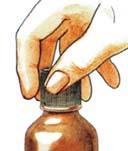 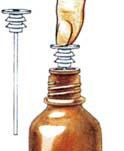 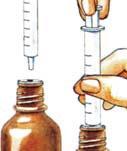 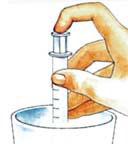 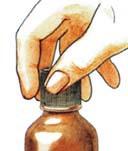 |
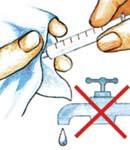
How long to take Equoral
Your doctor will tell you how long to take Equoral. This depends on whether you are taking it after a transplant or for a severe skin disease, rheumatoid arthritis, uveitis, or nephrotic syndrome. For severe psoriasis, treatment usually lasts 8 weeks.
Continue taking Equoral for as long as your doctor tells you.
If you have questions about how long to take Equoral, talk to your doctor or pharmacist.
Taking too much Equoral
If you accidentally take more than the recommended dose, tell your doctor immediately or go to the emergency department of your nearest hospital. You may need medical attention.
Missing a dose of Equoral
- If you forget to take a dose, take it as soon as you remember. However, if it is almost time for your next dose, skip the missed dose. Then take your next dose as usual. Do not take a double dose to make up for a missed dose.
Stopping Equoral treatment
Do not stop taking Equoral unless your doctor tells you to.
Continue taking Equoral even if you feel better. Stopping Equoral treatment may increase the risk of rejecting your transplanted organ.
If you have any further questions about taking this medicine, ask your doctor or pharmacist.
4. Possible side effects
Like all medicines, Equoral can cause side effects, although not everybody gets them.
Some side effects can be serious
Tell your doctor immediatelyif you notice any of the following serious side effects:
- Like other medicines that affect the immune system, cyclosporin may change your body's ability to fight infections and may increase the risk of developing cancer, especially skin and lymphatic system cancer. Signs of infection may include fever or sore throat.
- Changes in vision, loss of coordination, clumsiness, memory loss, difficulty speaking or understanding speech, and weakness. These may be signs of a brain infection called progressive multifocal leukoencephalopathy.
- Brain disorders with symptoms such as seizures, confusion, disorientation, decreased alertness, personality changes, agitation, insomnia, changes in vision, blindness, coma, paralysis, or stiffness of the neck, decreased coordination with (or without) speech or eye movement disturbances.
Back of the eye swelling. This may be associated with blurred vision. It may also affect vision due to increased pressure in the head (non-tumor-related increased intracranial pressure).
- Liver disorders with yellowing of the eyes or skin, nausea, loss of appetite, dark urine, or without these symptoms.
- Kidney disorders, which may severely reduce the amount of urine produced.
- Low red blood cell or platelet count. Symptoms may include pale skin, tiredness, shortness of breath, dark urine (due to red blood cell breakdown), bruising or bleeding without obvious cause, confusion, disorientation, decreased alertness, and kidney problems.
Other side effects
If you experience any of these side effects, tell your doctor.
Very common side effects:may affect more than 1 in 10 people.
- Kidney problems.
- High blood pressure.
- Headache.
- Uncontrolled shaking of the body.
- Excessive hair growth on the body and face.
- High levels of fats in the blood.
Common side effects:may affect 1 to 10 people in 100.
- Seizures (fits).
- Liver problems.
- High blood sugar levels.
- Tiredness.
- Loss of appetite.
- Nausea, vomiting, discomfort, and/or stomach pain, diarrhea.
- Excessive hair growth.
- Acne, flushing.
- Fever.
- Low white blood cell count.
- Numbness or tingling.
- Muscle pain, muscle cramps.
- Stomach ulcers.
- Gum overgrowth covering the teeth.
- High levels of uric acid and potassium in the blood, low levels of magnesium in the blood.
Uncommon side effects:may affect 1 to 10 people in 1,000.
- Brain disorders, including sudden seizures, confusion, insomnia, disorientation, vision disturbances, loss of consciousness, weakness, movement disorders.
- Rash.
- General swelling.
- Weight gain.
- Low red blood cell or platelet count, which may increase the risk of bleeding.
Rare side effects:may affect 1 to 10 people in 10,000.
- Nerve disorders with numbness or tingling in fingers and toes.
- Pancreatitis with severe stomach pain.
- Muscle weakness, loss of muscle strength, muscle pain in legs or arms or other muscles.
- Destruction of red blood cells, including kidney problems with symptoms such as swelling of the face, stomach, hands, and/or feet, decreased urine production, breathing difficulties, chest pain, seizures, loss of consciousness.
- Changes in menstrual cycle, breast enlargement in men.
Very rare side effects:may affect 1 to 10 people in 100,000.
- Back of the eye swelling, which may be associated with increased pressure in the head and vision disturbances.
Other side effects with unknown frequency:frequency cannot be estimated from available data.
- Severe liver disorders with yellowing of the eyes or skin, nausea, loss of appetite, dark urine, or without these symptoms.
- Bleeding under the skin or purple spots on the skin, sudden unexplained bleeding.
- Migraine or severe headache, often with nausea and vomiting and sensitivity to light.
- Hearing loss.
- Pain in legs and feet.
If you experience any side effects, including those not listed in this leaflet, tell your doctoror pharmacist.
Additional side effects in children and adolescents
No additional side effects are expected in children and adolescents compared to adults.
Reporting side effects
If you experience any side effects, including those not listed in this leaflet, tell your doctor, pharmacist, or nurse.
Side effects can be reported to the Medicines Adverse Reaction Monitoring Department of the Office for Registration of Medicinal Products, Medical Devices, and Biocidal Products:
Jerozolimskie Avenue 181C
02-222 Warsaw
Phone: +48 22 49 21 301
Fax: +48 22 49 21 309
Website: https://smz.ezdrowie.gov.pl
Side effects can also be reported to the marketing authorization holder.
Reporting side effects will help to gather more information on the safety of this medicine.
5. How to store Equoral
Keep this medicine out of the sight and reach of children.
Store in a cool, dry place, below 25°C, in the original packaging.
Do not store in the refrigerator or freeze.
Do not use the solution for more than 2 months after opening the bottle.
At temperatures below 20°C, Equoral oral solution 100 mg/ml may become cloudy. In this case, it is recommended to warm the medicine to room temperature (25°C) to clear the cloudiness. Any cloudiness of the solution does not affect its efficacy or dosing.
Do not use this medicine after the expiry date (EXP) stated on the packaging. The expiry date refers to the last day of the month.
Medicines should not be disposed of via wastewater or household waste. Ask your pharmacist how to dispose of medicines no longer required. This will help protect the environment.
6. Contents of the pack and other information
What Equoral contains
- The active substanceis cyclosporin. 1 ml of the solution contains 100 mg of cyclosporin.
- The other ingredientsare ethanol, vegetable oil, and hydrogenated castor oil.
What Equoral looks like and contents of the pack
Equoral is a yellow to brownish-yellow oily oral solution.
The pack contains 50 ml of the solution in a brown glass bottle with a PP (polypropylene) and HDPE (high-density polyethylene) cap with a white PTFE (polytetrafluoroethylene) inner membrane, in a cardboard box.
A dosing kit is included, consisting of an HDPE syringe and an LDPE (low-density polyethylene) tube with a dosing adapter, in a closable PP tube.
Marketing authorization holder and manufacturer
Marketing authorization holder
Teva Pharmaceuticals Polska Sp. z o.o.
Emilii Plater 53
00-113 Warsaw
Phone: (22) 345 93 00
Manufacturer
Teva Czech Industries s.r.o.
Ostravská 29
747 70 Opava-Komarov
Czech Republic
Teva Operations Poland Sp. z o.o.
Mogilska 80
31-546 Kraków
Date of last revision of the leaflet:
- Country of registration
- Active substance
- Prescription requiredYes
- Manufacturer
- ImporterTeva Czech Industries s.r.o. Teva Operations Polska Sp. z o.o.
- This information is for reference only and does not constitute medical advice. Always consult a licensed doctor before taking any medication. Oladoctor is not responsible for medical decisions based on this content.
- Alternatives to EquoralDosage form: Capsules, 25 mgActive substance: ciclosporinPrescription requiredDosage form: Capsules, 50 mgActive substance: ciclosporinPrescription requiredDosage form: Capsules, 100 mgActive substance: ciclosporinPrescription required
Alternatives to Equoral in other countries
The best alternatives with the same active ingredient and therapeutic effect.
Alternative to Equoral in Ukraine
Alternative to Equoral in Spain
Online doctors for Equoral
Discuss dosage, side effects, interactions, contraindications, and prescription renewal for Equoral – subject to medical assessment and local rules.



